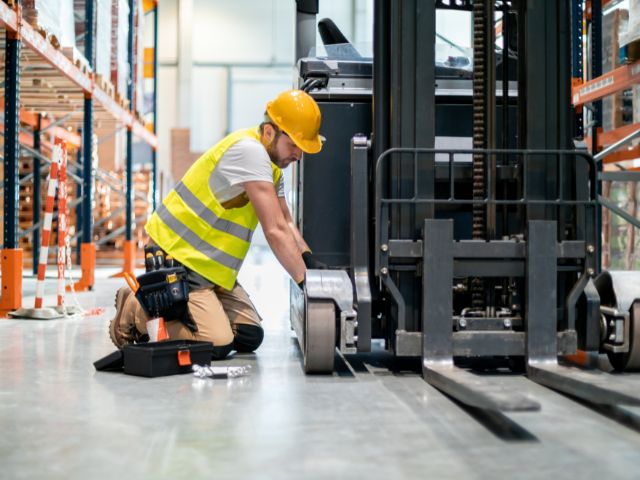

For many businesses, whether warehouses, storage depots, or retail stores, a forklift is critical to productivity and efficiency. So operators must look for signs of distress and problems with their forklifts. Below, we’ll explain some basic signs that your forklift needs repairs. Every operator should watch for them.
A clear indicator that there’s a significant problem with your forklift is leaking fluid. Leaking is a critical sign that you should never ignore. For forklifts, especially those that operate indoors, leaving fluid is dangerous. The underlying problem can grow worse, and others can slip. This is why regular inspections before and after using a forklift are critical to pinpoint leaks before they become even greater problems.
The mast chain of a forklift is critical to its operation as it’s responsible for lifting the carriage and the forks. Naturally, if that chain becomes damaged or worn down over time, it will need a replacement before the forklift can operate at full capacity. Chain issues are relatively common with forklifts. So if you’re troubleshooting and can’t find the problem, the chain is a good place to start.
If the chain shows any signs of rust or corrosion, protruding pins, or plate cracking, you should replace it immediately. Most forklift mast chains last roughly three to five years. If your forklift’s chain is around that age, keep a close eye on it and be ready for a replacement.
Every forklift operator knows how important the forks are, and they should replace them if they’ have significant damage. A forklift’s forks are bound to accumulate some damage over its lifespan, but operators should be wary not to get overconfident and reckless with their forks. These forks don’t last forever. And if they display signs of surface cracks or have significant bends, you should replace them before they damage products or personnel.
Forklifts are incredibly heavy vehicles, with the average forklift weighing roughly twice as much as the average car. And forklifts often operate in tight and confined spaces, stopping on a dime and maneuvering nimbly. If the brakes of a forklift start to go, that’s dangerous for the operator and anyone else nearby. If your forklift’s brakes ever feel soft or spongy, have them checked or replaced immediately.
There’s no clearer sign that your forklift needs repairs than the dashboard flashing warning lights at you. Those dashboard warning lights are not for show—they’re only supposed to activate if a significant issue requires immediate attention. If a warning light you’re unfamiliar with goes off on your forklift, pull over immediately and check the manual to discover the issue.
Forklift maintenance and inspections are crucial in finding these common issues before they become significant problems and dangerous to operators. Remember to follow your forklift maintenance service manual and inspect the forklift before use.
24World Media does not take any responsibility of the information you see on this page. The content this page contains is from independent third-party content provider. If you have any concerns regarding the content, please free to write us here: contact@24worldmedia.com

A Brief Look at the History of Telematics and Vehicles

Tips for Helping Your Students Learn More Efficiently

How To Diagnose Common Diesel Engine Problems Like a Pro

4 Common Myths About Wildland Firefighting Debunked

Is It Possible To Modernize Off-Grid Living?

4 Advantages of Owning Your Own Dump Truck

5 Characteristics of Truth and Consequences in NM

How To Make Your Wedding More Accessible

Ensure Large-Format Printing Success With These Tips

4 Reasons To Consider an Artificial Lawn

The Importance of Industrial Bearings in Manufacturing

5 Tips for Getting Your First Product Out the Door